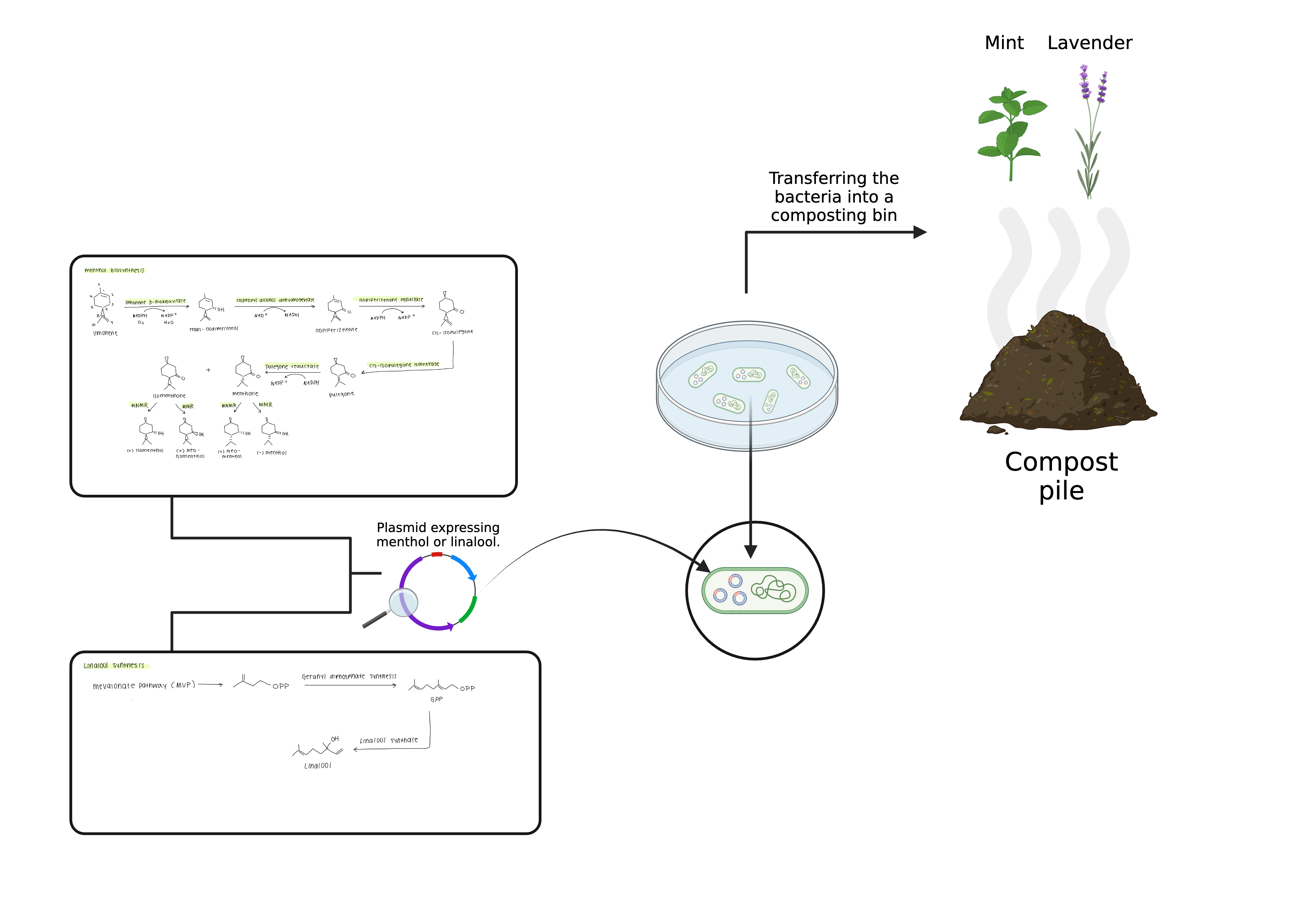Description
The problem we want to address and how we are planning to do it:
One of the most common barriers with composting is the associated unpleasant odors, which prevents a wider adoption of composting practices. The importance of this problem lies in the potential to significantly increase the effectiveness and scope of composting practices in urban settings. By making composting more accessible and appealing, NuScent hopes to encourage more people to participate in sustainable food-waste management practices.
Additionally, there is a general lack of awareness in cities about the resources available for composting and the environmental benefits it offers. Our project will address these issues by using synthetic biology to produce compounds that create a pleasant aroma in compost, making it more agreeable for in-home use. Furthermore, the scents we develop will have properties that repel pests, thereby reducing another barrier to urban composting. Alongside these technical solutions, we will engage with the community and provide educational opportunities to raise awareness about composting benefits and resources; these steps will help foster a more sustainable urban environment. Menthol, the primary constituent of peppermint oil, is a monoterpene natural product. The biosynthetic pathway, enzymes, and molecular genetics involved in the production of menthol are well studied in plants, but still have knowledge gaps when applied to microbes. We will engineer the 8-step biochemical pathway of menthol production into microbe E. coli to produce the peppermint smell. To determine which has the best compatibility, we will test each microbe with different compostable substrates. As an added bonus, peppermint oil scent has been found to deter mice, which could further add to our goals of making composting more effective in urban environments.
A secondary target we are interested in biochemically synthesizing is linalool, a floral terpene alcohol found in over 200 plants, including lavender. Since mice are similarly repelled by the scent of lavender, this could further add to our goal of enhancing the benefits of urban composting. Through eliminating repetitive sequences in plasmid constructs, encoding linalool production, and integrating them into the genomes of bacteria of interest, we aim to also replicate a lavender smell. The literature the team studied primarily focused on linalool production in E. coli, however, one of our main objectives for this project is to find out if bacteria E. coli is an efficient choice for the production of menthol and linalool.

Why we chose this project:
Composting, a process that transforms dinner leftovers into earth-friendly nourishment, is a powerful method of reducing waste, enhancing soil health, and actively combatting climate change. Despite these numerous benefits, a staggering 1.6 million tons of compostable food went to waste in Massachusetts alone in 2022. So, here is the pressing question: why don’t more Boston residents participate in composting? And, more importantly, what can Northeastern University do to address this community issue?
When researching the problem, the NuScent team discovered that a major deterrent to composting is the unpleasant scent of decomposing food and the to attraction of pests. Many individuals in the community lack awareness of both composting resources and the benefits of successful composting, so NuScent decided to tackle this problem. Conversations about sustainability and global health have become increasingly relevant-specifically pertaining to how normal individuals within society can make easy changes within their daily lives. This can begin by reforming the way individual households manage food waste. Currently at Northeastern, the composting program is only enforced in a few dorms, with 30-40% of students in the select dorms participating. In the United States, only 6% of food scraps make it to composting facilities, while the rest contributes to overflowing landfills and produces greenhouse gases. NuScent’s objective is to greatly increase the percentage of food scraps that are composted by reducing barriers that make it challenging for individuals to compost at home
References we used to get inspired and research our project:
- https://www.nature.com/articles/s41467-022-33974-7 - Bioengineering Microbes for Nutrition
- https://2016.igem.org/Team:Glasgow - Beta Carotene Producing E. coli
- https://2020.igem.org/Team:Lethbridge_HS/Design - Speed Up Compost Process
- https://2023.igem.wiki/heidelberg/results - Breaking Down PET
- https://2022.igem.wiki/msp-maastricht/engineering - Biodesalination of Water
- https://2023.igem.wiki/kyoto/description - Deer deterrent odors to save crops
Citations
Carroll, A. L., Desai, S. H., & Atsumi, S. (2016). Microbial production of scent and flavor compounds. Current Opinion in Biotechnology, 37, 8-15.
https://doi.org/10.1016/j.copbio.2015.09.003Orkin. (2023, August 31). Can peppermint oil repel mice & bugs? Orkin. Accessed April 8, 2024.
https://www.orkin.com/ask-orkin/peppermint-oil-pest-controlRinaldi, M. A., Tait, S., Toogood, H. S., & Scrutton, N. S. (2022). Bioproduction of linalool from paper mill waste. Frontiers in Bioengineering and Biotechnology, 10, 892896.
https://doi.org/10.3389/fbioe.2022.892896Ding, H., Luo, C., Li, Y., Li, Q., & Dong, Y. (2024). Impact of Bacillus subtilis and Pseudomonas fluorescens beneficial bacterial agents on soil-borne diseases, growth, and economics of continuous cropping of flue-cured tobacco. Crop Protection, 177, 106556.
https://doi.org/10.1016/j.cropro.2023.106556Wang, S., Long, H., Hu, X., et al. (2024). The co-inoculation of Trichoderma viridis and Bacillus subtilis improved the aerobic composting efficiency and degradation of lignocellulose. Bioresource Technology, 394, 130285.
https://doi.org/10.1016/j.biortech.2023.130285Boukhatem, M. N., Kameli, A., & Saidi, F. (2013). Essential oil of Algerian rose-scented geranium (Pelargonium graveolens): Chemical composition and antimicrobial activity against food spoilage pathogens. Food Control, 34(1), 208-213.
https://doi.org/10.1016/j.foodcont.2013.03.045Wang, X., Zhang, X., Zhang, J., et al. (2023). Metabolic engineering of Escherichia coli for efficient production of linalool from biodiesel-derived glycerol by targeting cofactors regeneration and reducing acetate accumulation. Industrial Crops and Products, 203, 117152.
https://doi.org/10.1016/j.indcrop.2023.117152